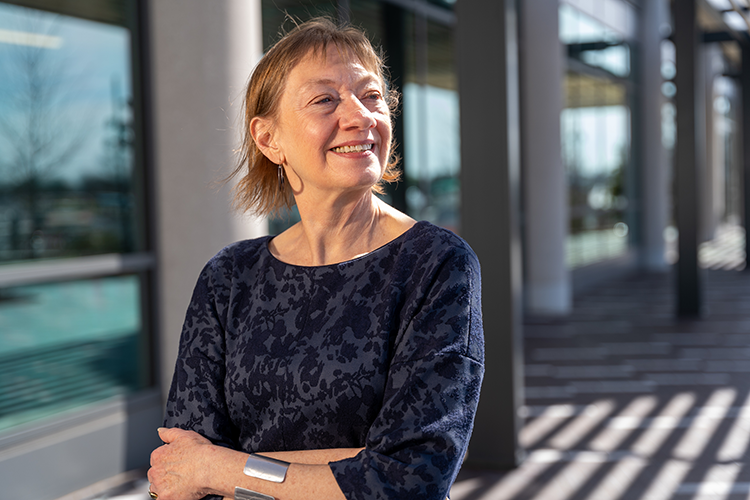Nina Olson has devoted her career to protecting taxpayer rights

Nina Olson founded the Center for Taxpayer Rights after being in the IRS for 18 years. Her experience was "something I didn’t want to walk away from. I needed to share it in some way.” (Photo by Arnold Adler/ABA Journal)
Nina Olson has been a staunch advocate for taxpayers for more than 30 years.
In her latest of several significant endeavors, she founded and serves as executive director of the Center for Taxpayer Rights, a nonprofit corporation in Washington, D.C., that advances taxpayer rights in the United States and internationally.
As part of her work, she promotes pro bono representation for low-income taxpayers who are involved in disputes with the Internal Revenue Service. She calls for systemic change by submitting amicus curiae briefs in federal and state tax cases and by educating government officials and the public about tax procedure and taxpayer rights.
Olson, a longtime member of the ABA Section of Taxation and past chair of its Low Income Taxpayers Committee, also works closely with her colleagues to implement initiatives that help taxpayers in need.
The Inmate Tax Assistance Project, a collaboration between the Tax Section and Center for Taxpayer Rights, assists incarcerated and recently released taxpayers who are eligible for stimulus payments. Olson says they still want pro bono volunteers for this phase and for later representation, which could include handling audits or Tax Court proceedings.
“It was the ABA Tax Section that provided me opportunities to meet people, to learn things, to work on projects,” says Olson, who received its Distinguished Service Award in 2017 and Janet Spragens Pro Bono Award in 2019. “It’s extraordinary, their leadership on pro bono work and low-income issues, and it’s made the tax system so much more equitable.”

Alice Abreu, the chair-elect of the Tax Section, has known Olson for many years and considers her a valued colleague and friend. When Abreu describes Olson’s most inspiring attributes, she says Olson gets things done.
“She has fire in her belly and the courage of her convictions,” says Abreu, the director of the Center for Tax Law and Public Policy at Temple University Beasley School of Law and a past board member of the Center for Taxpayer Rights. “If she believes in something, she is going to follow it and make it happen. That’s how she felt about the importance of having legal services in tax available to low-income individuals.”
Representing low-income taxpayers
Olson, who grew up near Philadelphia, wasn’t immediately drawn to tax law.
She majored in fine arts at Bryn Mawr College and graduated in 1976. She had moved to Chapel Hill, North Carolina, where she had her own painting studio. But then Olson became a secretary and bookkeeper for a young lawyer.
“I went down to the [University of North Carolina] bookstore, got myself an accounting textbook and started doing bookkeeping,” Olson says. “That led to doing tax returns, and for years, I had an accounting, bookkeeping and tax return preparation business.”
Olson, who also had her son in 1976, was in New York City for a tax course when she decided she would benefit from going to law school. She went to a local bookstore, and this time bought a LSAT study guide.
Olson attended the North Carolina Central University School of Law, which offered a four-year evening program. After graduating in 1991, she expanded her business to include tax law matters. She also wanted to help low-income taxpayers—who often appeared pro se in court—but couldn’t find many pro bono opportunities.
She decided to create her own, and in 1992 founded the Community Tax Law Project in Richmond, Virginia. As the country’s first independent low-income taxpayer clinic, it provided free legal services to low-income residents in federal, state and local tax controversies.
By its second year, she says, Olson—who ran the clinic out of her law office—had recruited more than 150 attorneys to help with cases. In 1997, she testified before the U.S. Congress about the need for more representation for low-income taxpayers, including those who spoke English as a second language.
“Otherwise, their issues would not be addressed,” Olson says. “The only issues that would come before the court would be from people who could afford representation. And the only people who could comment on regulations or IRS procedures were people who could afford lobbyists.”
She adds: “I also talked about the difficulty of getting funding for programs, because you would go to a funder and say, ‘I need to help low-income people with the IRS.’ And they would say, ‘How can low-income people have tax problems?’”
Testimony from Olson and fellow advocates led Congress in 1998 to pass Internal Revenue Code Section 7526, which made available federal grants to provide matching funds for the development of low-income taxpayer clinics.
 “My path through life is evidence that there are many ways of approaching problems,” says Nina Olson. (Photo by Arnold Adler/ABA Journal)
“My path through life is evidence that there are many ways of approaching problems,” says Nina Olson. (Photo by Arnold Adler/ABA Journal)
Taking the lead on tax issues
Nearly three years later, Olson stepped into another influential role.
In 2001, she became the national taxpayer advocate, which is appointed by the U.S. secretary of the treasury and reports directly to the Internal Revenue Service commissioner. In this position, Olson led the Taxpayer Advocate Service, an independent organization within the agency that helps taxpayers resolve problems that cause them financial difficulty.
During her 18-year tenure, Olson issued nearly 40 reports to Congress, in which she identified the most serious issues facing taxpayers and recommended systemic changes to address those issues.
“We had about 4 million cases, and it was an incredible database of things that went wrong inside the IRS,” Olson says. “Sometimes it was a taxpayer who didn’t understand what was needed. Sometimes the IRS was getting it completely wrong. And sometimes the IRS had no procedures to address a particular problem, and we needed to create new procedures.”
Olson, who received her LLM in taxation from Georgetown in 2004, also testified before Congress about taxpayer rights and tax administration more than 60 times. In addition, she authored a Taxpayer Bill of Rights, which the Internal Revenue Service adopted in 2014 and Congress codified in 2015.
As national taxpayer advocate, Olson gained oversight of the Low Income Taxpayer Clinic grant program. Over the years, she watched the program grow from just her Community Tax Law Project and a handful of academic clinics to more than 130 programs nationwide. There are several more in Australia, Ireland and the United Kingdom.
“It’s a very strong movement,” Olson says. “You now have a group that can comment on regulations, talk about the impact on the low-income taxpayer and do research studies … literally none of that existed before the founding of these low-income taxpayer clinics and their funding mechanism.”
Focusing on the work ahead
Armando Gomez, a partner at Skadden, Arps, Slate, Meagher & Flom in Washington, D.C., is a past chair of the ABA Tax Section and recommended Olson for the role of national taxpayer advocate. He was impressed by her energy and passion, and, he says, already thought of her as a leading advocate for taxpayer rights.
 “Throughout my life I have been told, ‘You can’t do things that way, or you have to do things this way.’ That makes me nuts,” says Olson. (Photo by Arnold Adler/ABA Journal)
“Throughout my life I have been told, ‘You can’t do things that way, or you have to do things this way.’ That makes me nuts,” says Olson. (Photo by Arnold Adler/ABA Journal)“Nina is just relentless,” Gomez says. “While she was at the IRS, she really made the organization what it is today. And through her advocacy, she caused people within the IRS and people in Congress to look at issues differently than they otherwise would have. She clearly made an impact.”
When Olson retired from the Internal Revenue Service in 2019, she knew her work wasn’t finished.
“I kept saying, ‘I’m privileged and lucky to have been in the IRS for 18 years, and to have a sense of how the IRS works,’” she says. “That’s something I didn’t want to walk away from. I needed to share it in some way.”
That same year, Olson started the Center for Taxpayer Rights. Among its other initiatives, she helped launch the LITC Support Center, which provides technical assistance to low-income taxpayer clinics. It also operates LITC Connect, a national network that links clinics that need volunteers with tax professionals who are interested in volunteering.
The organization additionally hosts the International Conference on Taxpayer Rights, which Olson founded in 2015 when she was the national taxpayer advocate. This year’s conference is June 4-6 in Antwerp, Belgium.
“Throughout my life I have been told, ‘You can’t do things that way, or you have to do things this way,’” says Olson, who is also a member of the ABA Section of Administrative Law and Regulatory Practice and received its Mary C. Lawton Award for Outstanding Government Service in 2023. “That makes me nuts.”
She adds: “My path through life is evidence that there are many ways of approaching problems. Problem-solving is best served by listening and putting yourself in the way of diverse people and experiences. Those experiences help inform my next step on my life’s path.”
Members Who Inspire is an ABA Journal series profiling exceptional ABA members. If you know members who do unique and important work, you can nominate them for this series by emailing [email protected].



